Introduction
In today's digital age, the seamless operation of an organization's IT network is not just a convenience but a necessity. Network support companies play an indispensable role in ensuring this seamless operation by managing an array of network-related tasks, from troubleshooting connectivity issues to implementing robust security measures. These companies are equipped with expertise in both hardware and software components of network infrastructure, making them vital partners for any technology-reliant organization.
The strategic importance of network support companies is exemplified by organizations like Bemol, a Brazilian retail chain operating in remote areas of the Western Amazon. Bemol's reliance on these companies highlights how essential network support is for deploying scalable and reliable wireless infrastructure in challenging environments. Additionally, the integration of AI-driven customer experience intelligence by telecom operators has revolutionized network management, showcasing the transformative potential of advanced network support.
Renowned providers such as Black Box further illustrate the critical role of professional network support. Their ability to build hyperscale data centers and provide cutting-edge infrastructure solutions across vast geographic areas ensures secure, seamless connectivity and collaboration for businesses worldwide.
As digital landscapes continue to evolve, network support companies remain pivotal in aligning technology with strategic business goals, enabling organizations to thrive and innovate. This article delves into the key services provided by these companies, the importance of network management, the benefits of outsourcing network support, and the tools and technologies employed to enhance network security and performance.
What is a Network Support Company?
A support service plays a crucial role in the seamless functioning and maintenance of an organization's IT systems. These companies are instrumental in managing various network-related tasks, from troubleshooting connectivity issues to implementing robust security measures. Their expertise encompasses both hardware and software components of communication infrastructure, making them indispensable partners for technology-reliant organizations.
For example, Bemol, a Brazilian retail chain operating in over 50 municipalities in the Western Amazon, emphasizes the significance of dependable infrastructure. With over 80 physical stores, five distribution centers, and a significant e-commerce presence, Bemol faced unique logistical challenges in remote areas. Network support companies enabled Bemol to deploy scalable and reliable wireless infrastructure, providing free public WI-Fi to customers in isolated regions, ensuring connectivity where it was scarce.
Furthermore, the incorporation of AI-driven customer experience (CX) intelligence by telecom operators has transformed management systems. By leveraging AI, operators can predict customer needs, reduce capital expenditure by 5% to 10%, and increase sales conversion by 10% to 15%. This advanced approach transforms systems into core products managed with a focus on CX, driving higher customer satisfaction and business success.
Well-known IT solutions firms such as Black Box illustrate the importance of professional assistance. Their ability to build hyperscale data centers and provide cutting-edge infrastructure solutions across vast geographic areas makes them a premium choice. Black Box's extensive reach and expertise ensure secure, seamless connectivity and collaboration for businesses globally.
'In the swiftly changing digital environment, service providers are crucial in aligning technology with strategic business objectives, allowing organizations to prosper and innovate.'.
Key Services Provided by Network Support Companies
Network support companies provide a comprehensive range of services tailored to address the varied requirements of their clients. These services include real-time system monitoring, prompt troubleshooting, and the installation of essential hardware and software. Additionally, they manage configuration settings and conduct routine maintenance to ensure optimal performance. An essential element of their service is data protection, which safeguards information from unauthorized access and possible dangers. For instance, as the Port of Tallinn expanded its operations, it required improved system performance to handle increased information transfer, video streaming, and security camera systems, emphasizing the necessity of robust security measures. Moreover, support firms provide backup options and disaster recovery strategies to protect essential data, guaranteeing that activities continue without interruption even in challenging situations. This comprehensive method guarantees that clients such as the Port of Tallinn and the Nordic Hotel Forum can sustain efficient and secure system infrastructures, fulfilling the requirements of contemporary digital advancements.
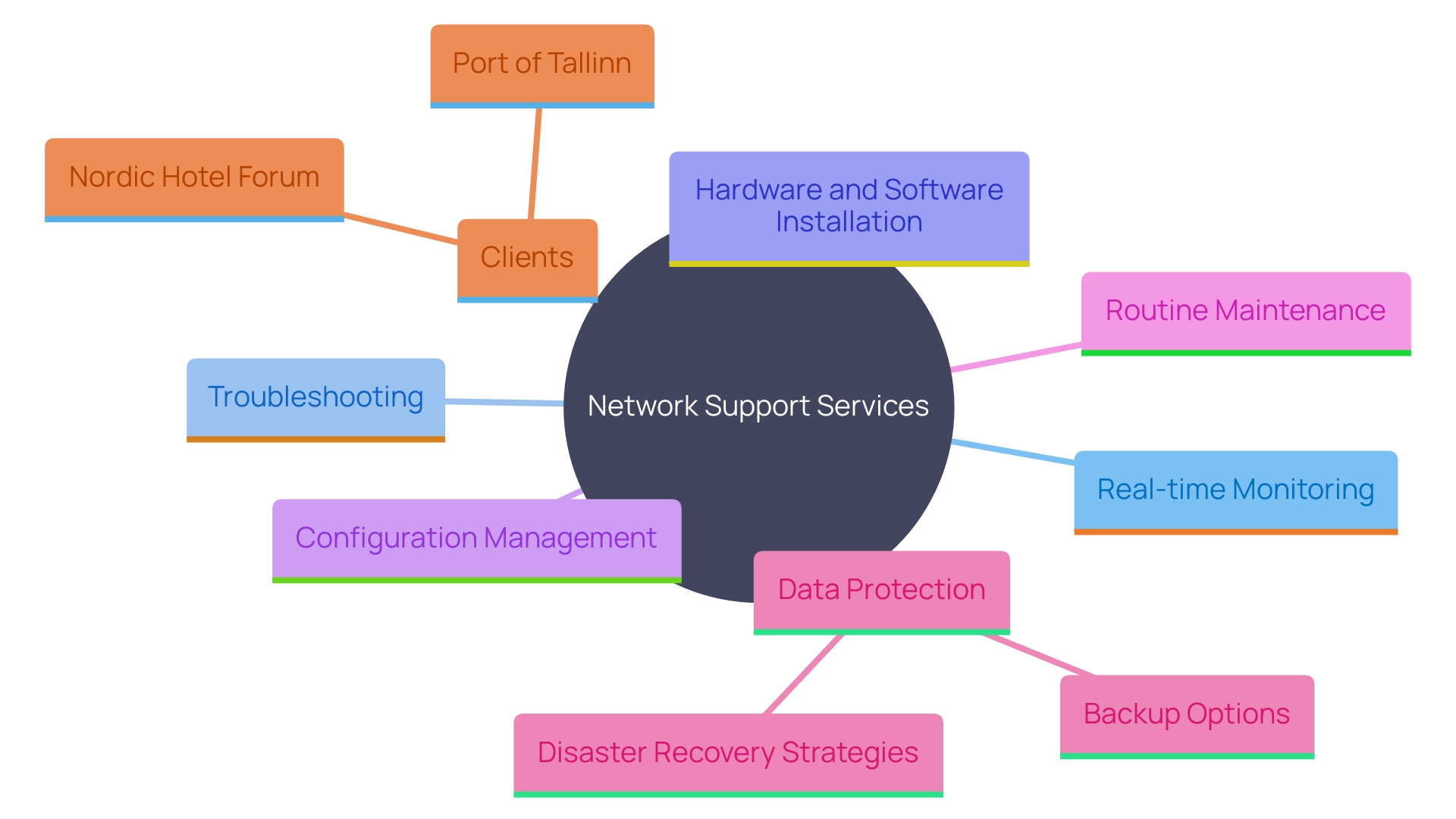
Importance of Network Management
Efficient system management is crucial for sustaining operational effectiveness within an organization. This process involves monitoring and controlling resources to ensure optimal performance and uptime, which is critical in today’s fast-paced technological landscape. Effective management of systems aids in recognizing and addressing possible issues before they develop into significant problems, reducing downtime and guaranteeing business continuity.
A case in point is the Port of Tallinn, one of Europe’s fastest-growing seaports. The port's expansion required assistance for a growing need for services, significantly enhancing the amount of transferred information through its system. By improving its core systems and infrastructure, the Port of Tallinn managed to increase capacity and eliminate downtime, ensuring operational efficiency for its critical seaport functions.
'Dependence on systems and application automation has also expanded, propelled by rising complexity and the need for agility and reliability.'. 'As per Grand View Research, the automation market is anticipated to increase by 3 percent from 2022 to 2030.'. Automation streamlines processes, boosts productivity, and enables insight-driven decisions. However, Gartner notes that over 65% of enterprise networking activities are still performed manually, highlighting the need for intelligent systems and seamless integration.
Advanced information and communication technology have revolutionized production chains, as seen in U.S. manufacturing. Studies by Chris Forman and Kristina McElheran revealed that internet-enabled technology facilitates better coordination between production units, transforming business operations.
'Strategic data transfer and management of systems are thus paramount for maintaining agility, competitiveness, and operational efficiency in a rapidly evolving tech landscape.'. As companies keep embracing new technologies such as AI and composability, strong management of systems will be essential in navigating opportunities and challenges. The insights from the State of Observability for IT and Telecommunications Report underscore the importance of observability in deriving business value and maintaining a competitive edge.
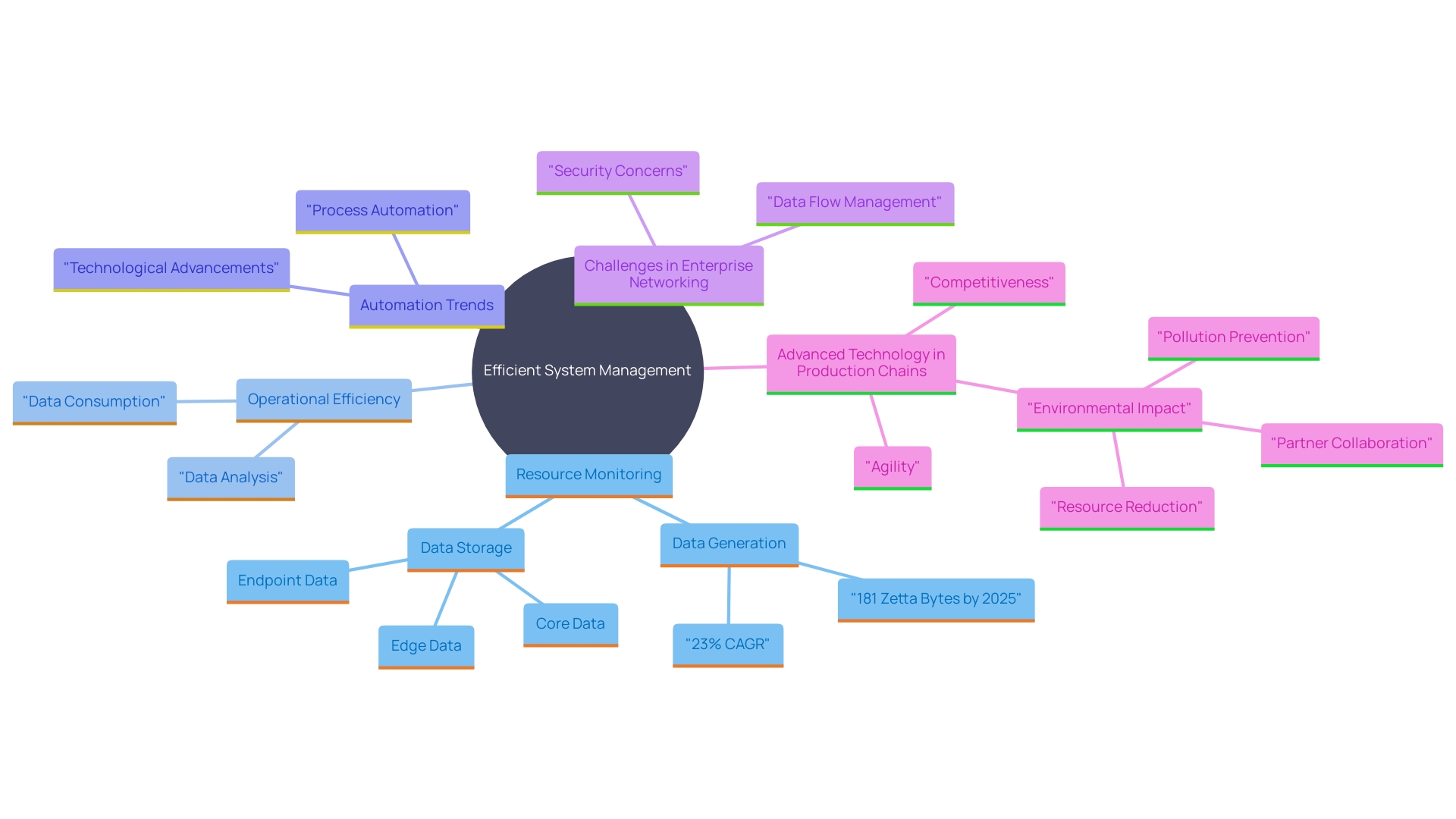
Benefits of Outsourcing Network Support
Contracting external assistance for systems provides multiple strategic benefits. Businesses can access specialized expertise without the need to hire full-time staff, leading to significant cost savings. This method enables organizations to concentrate on their primary strengths while specialized teams manage the infrastructure. As Carl Eller, Senior Director of Information Security and Technology Management at SCCPSS, highlights, outsourcing can be a game-changer for organizations with limited financial resources. 'We aim to safeguard information so it cannot be utilized against parents or students,' he mentions, highlighting the effectiveness and dependability attained through expert assistance.
Moreover, modern outsourcing strategies like nearshoring provide additional benefits beyond cost reduction. Nearshoring leverages the strong educational systems and burgeoning tech talent pools in nearby countries, offering a reservoir of skilled professionals. This not only improves connectivity performance but also fosters innovation and expansion within the organization. By adopting such strategies, businesses can ensure their technological infrastructure remains robust and adaptable, aligning with long-term strategic goals.
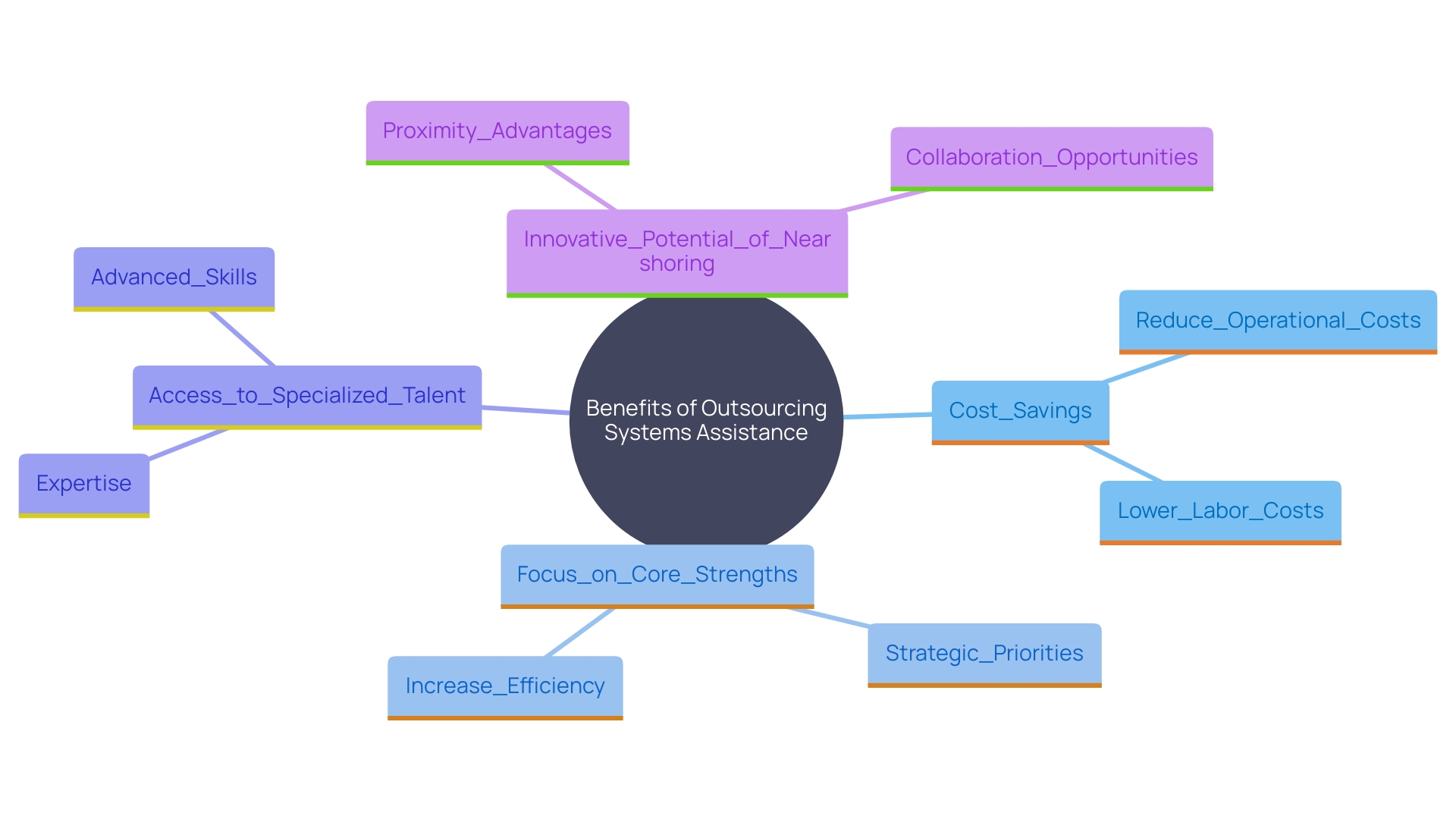
How Network Support Companies Enhance Network Security
Network support firms are essential in strengthening an organization's network protection. They implement comprehensive strategies such as regular assessments, vulnerability scanning, and deploying advanced firewalls and intrusion detection systems. Staying informed about the latest threats and trends allows these companies to proactively mitigate potential vulnerabilities and ensure compliance with industry regulations, significantly reducing the risk of data breaches and cyberattacks.
For instance, the Port of Tallinn, one of Europe's rapidly expanding seaports, required to improve its infrastructure to accommodate rising service demands and digital advancements such as video streaming and surveillance camera systems. 'The port's transition required a solution to increase capacity, eliminate downtime, and ensure operational efficiency.'. This real-world example highlights the significance of solid infrastructure in ensuring smooth operations and strong protective measures.
The worldwide software market for protection is witnessing notable expansion because of the increasing occurrence of cyberattacks. As reported by the Australian Cyber Security Center, cybercrime reports surged by nearly 13% from the 2020-2021 financial year to 2021-2022. 'This growing danger environment emphasizes the essential requirement for organizations specializing in protecting information systems, infrastructures, and computer networks.'.
Furthermore, the cybersecurity skills gap, with an estimated 600,000 unfilled positions in the U.S. alone, has driven many organizations to rely on third-party partnerships for their security needs. By working together with infrastructure assistance firms, organizations can utilize specialized expertise and technologies to safeguard their environments efficiently.
In summary, service providers for connectivity offer essential assistance that guarantees an organization's system stays safe, adheres to regulations, and is robust against changing cyber dangers.
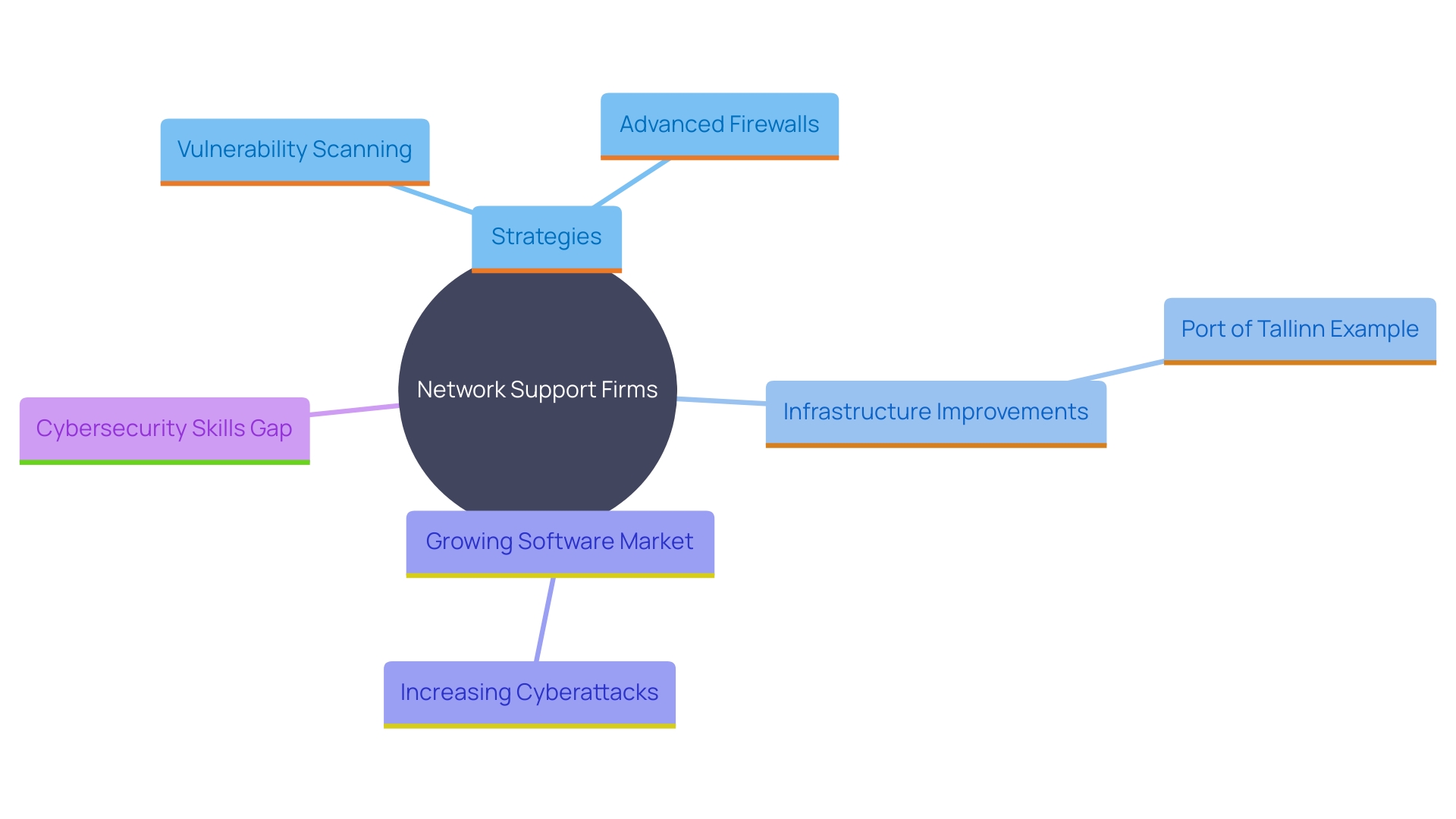
Tools and Technologies Used by Network Support Companies
To effectively oversee and assist systems, firms utilize a variety of sophisticated instruments and technologies. Vital tools encompass monitoring software, which notifies teams of possible problems before they intensify, and configuration management systems that guarantee consistency and adherence throughout the complete system. Remote access solutions are also crucial, enabling assistance teams to diagnose and resolve issues swiftly, regardless of location.
The integration of cloud-based solutions offers scalability and flexibility, enabling seamless adaptation to evolving business requirements. Additionally, the rise of AI and machine learning in system support is revolutionizing infrastructure management. These technologies enhance predictive maintenance, optimize resource allocation, and bolster security measures.
For instance, the application of AI-driven system monitoring tools can significantly decrease downtime by forecasting failures and automating responses. This not only enhances efficiency but also guarantees a more robust infrastructure. The rising occurrence of cyber attacks further emphasizes the significance of strong security measures, as noted by the Australian Cyber Security Center, which reported a 13% rise in cybercrime during 2021-2022.
In this rapidly evolving landscape, staying ahead of technological advancements is crucial. Companies like Comarch are recognized for their commitment to innovation and the development of robust solutions tailored to meet both current and future needs in the field service sector. This commitment to ongoing enhancement guarantees that support services stay at the leading edge of technological advancement, providing outstanding reliability and performance.
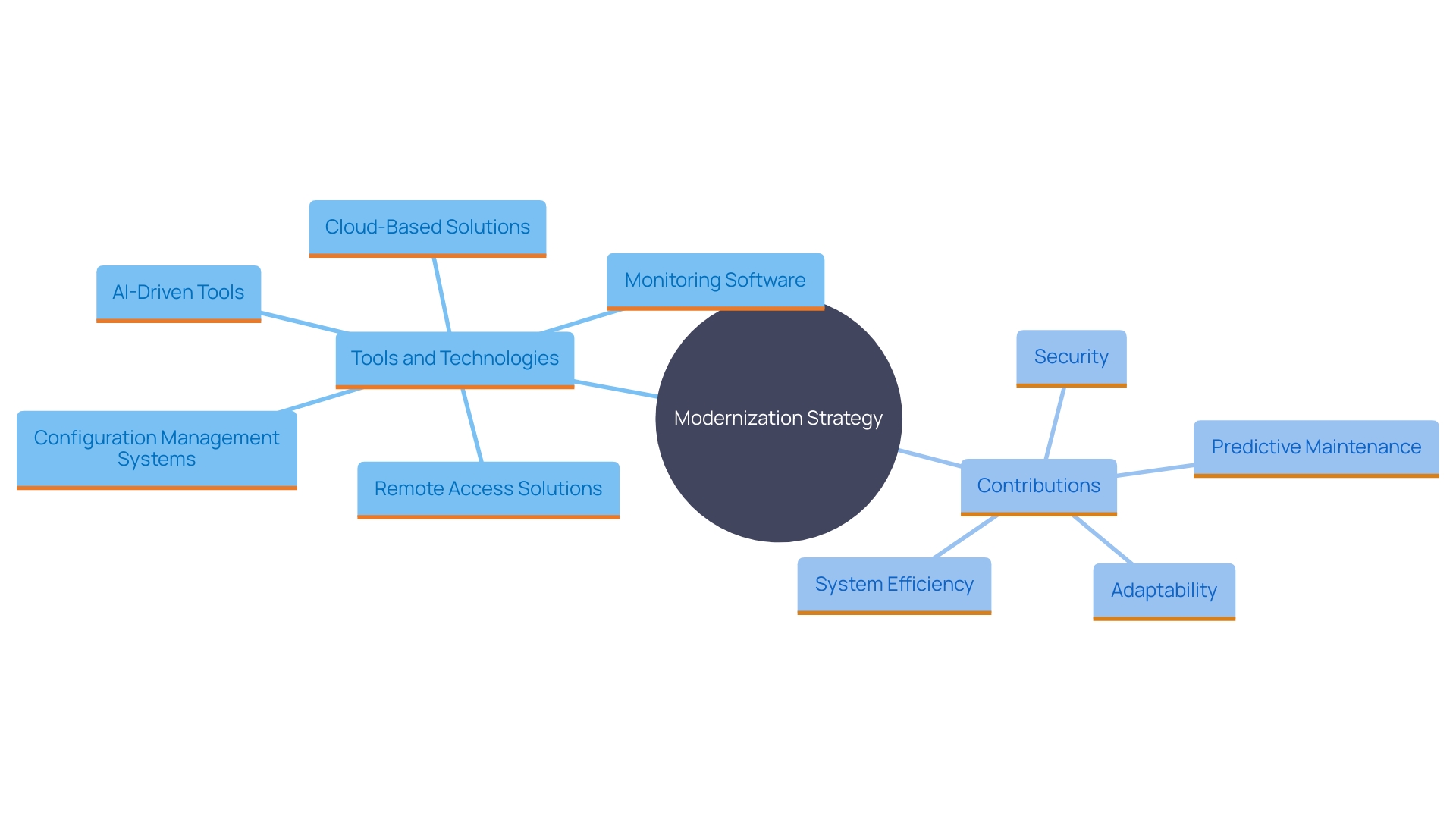
Best Practices for Effective Network Management
Incorporating best practices in system management is essential for ongoing organizational success. Regular hardware and software updates ensure that the infrastructure remains robust and secure. Routine maintenance checks, paired with clear communication protocols, streamline operations and minimize downtime. Adopting a proactive approach in monitoring and incident response can significantly enhance system reliability, decreasing the likelihood of outages.
Investment in employee training is equally essential. Ensuring that staff are well-versed in security policies and best practices fosters a culture of security awareness throughout the organization. This approach not only protects the system but also enables employees to contribute to a secure and efficient technological environment.
For instance, Pima Community College faced significant challenges with its outdated and complex system infrastructure. By revamping their communication system, they managed to enhance performance and meet the evolving technology needs of their faculty, students, and staff. Similarly, the Jeju Dream Tower in South Korea, with its extensive technological requirements, implemented cutting-edge solutions to support its operations effectively.
Modernizing enterprise architecture remains a critical path to becoming a digital, AI, and data-driven business. Leveraging tools such as Software-Defined Wide-Area Networks (SD-WAN) can provide enhanced oversight and management capabilities. This holistic view of interconnected environments allows for better performance monitoring and automated recovery processes, ensuring a future-focused and resilient network infrastructure.
Conclusion
The critical role of network support companies in today's digital landscape cannot be overstated. These organizations are essential in ensuring the seamless operation of IT networks, providing a comprehensive suite of services that includes troubleshooting, security management, and infrastructure development. As demonstrated by successful examples such as Bemol and the Port of Tallinn, effective network support enables organizations to overcome logistical challenges and enhance operational efficiency, thereby fostering innovation and growth.
Outsourcing network support presents numerous advantages, particularly for organizations seeking specialized expertise without the financial burden of maintaining in-house teams. This strategic approach allows businesses to concentrate on their core competencies while leveraging the skills and technologies of dedicated support teams. Furthermore, the adoption of modern outsourcing strategies, such as nearshoring, enhances network performance and drives innovation by tapping into local talent pools.
As the threat landscape continues to evolve, the importance of robust network security becomes increasingly evident. Network support companies employ advanced tools and technologies to safeguard organizational data, ensuring compliance with industry standards and protecting against cyber threats. The integration of AI and machine learning into network management further enhances predictive capabilities, streamlining operations and bolstering resilience.
In summary, the partnership with network support companies is a strategic necessity for organizations aiming to thrive in a technology-driven environment. By embracing best practices in network management and investing in professional support, organizations can secure their infrastructures, optimize performance, and maintain a competitive edge in an ever-evolving digital landscape.




